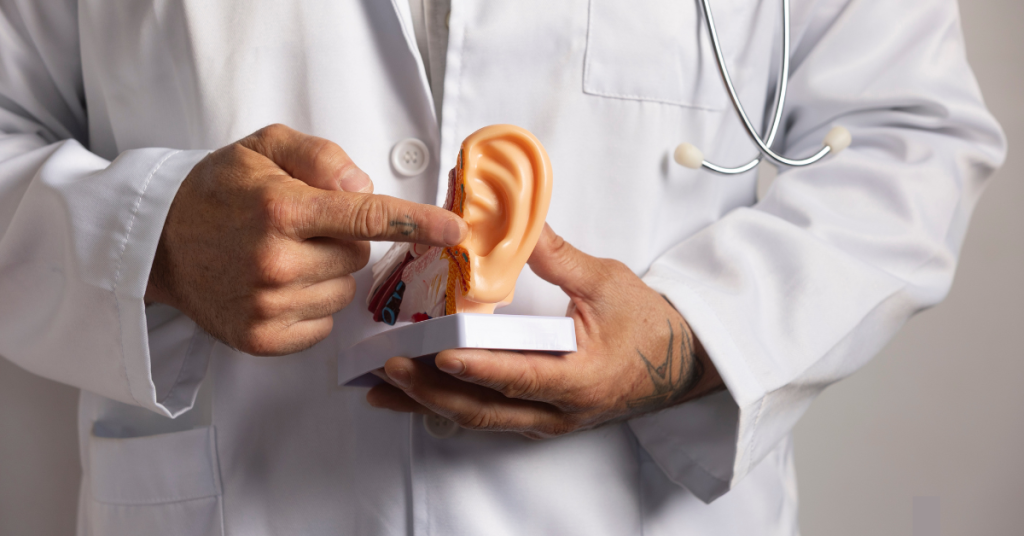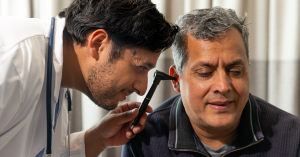Most people think of hearing and balance as two entirely separate senses—but they’re more closely connected than you might realize. If you’ve ever felt dizzy or off-balance and also noticed changes in your hearing, you’re not alone. Many adults, especially those over 50, experience both hearing loss and balance issues, and the connection isn’t just coincidental.
Our ability to stay steady on our feet is partially controlled by the inner ear, which also happens to be where hearing takes place. When something goes wrong in one part of the system, it can affect the other. This means that hearing loss isn’t just about missing words in conversation—it could also put you at greater risk for falls, dizziness, or a general feeling of unsteadiness.
This article explores the fascinating—and sometimes surprising—relationship between hearing and balance. You’ll learn how the two systems work together, what happens when hearing loss throws things off balance (literally), and what steps you can take to protect both your hearing and your stability as you age.
The Science Behind Balance and Hearing
To understand how hearing loss can affect balance, it helps to first look at the inner ear—where both hearing and balance originate. Tucked deep inside the skull, the inner ear houses two major systems: the cochlea, which is responsible for hearing, and the vestibular system, which manages balance. These two structures sit side by side and share not only physical space but also neurological pathways that connect to the brain.
The vestibular system includes three semicircular canals, two otolith organs (the utricle and saccule), and a network of sensory cells. These components detect head movement, orientation, and acceleration. For example, when you turn your head or move suddenly, the fluid inside the semicircular canals shifts, triggering signals that are sent to the brain to help you maintain balance and posture.
Meanwhile, the cochlea is a spiral-shaped organ that transforms sound waves into electrical signals that the brain can interpret as sound. The proximity and integration of the cochlea and vestibular structures mean that damage to one often affects the other. This is particularly true for age-related changes, infections, or trauma that impact the delicate structures or nerves within the inner ear.
Both systems rely on the vestibulocochlear nerve (cranial nerve VIII) to transmit information to the brain. This shared pathway allows the brain to process sound and spatial orientation simultaneously—but it also means that when something disrupts this communication, such as hearing loss or inner ear disease, it can throw off your sense of balance.
Additionally, the brain integrates input from your vision and proprioception (the sense of your body’s position in space) along with information from the vestibular and auditory systems. When one system is compromised—like when hearing begins to decline—the brain has to work harder to compensate, and this extra effort can sometimes lead to imbalance or dizziness.
Understanding this relationship is essential not just for treating balance disorders, but also for recognizing the full impact of hearing loss. It’s not just about hearing less clearly—it’s about how your body navigates the world around you.
How Hearing Loss Disrupts Balance
When people begin to lose their hearing, they often notice more than just missed conversations or needing to turn up the TV. Many also report feelings of unsteadiness, dizziness, or even frequent falls. This isn’t a coincidence—hearing loss can directly disrupt the systems your brain relies on to maintain balance.
One of the primary ways hearing loss affects balance is through damage to the inner ear, particularly in the cochlea and vestibular system. In cases of sensorineural hearing loss—the most common type associated with aging or noise exposure—the delicate hair cells inside the cochlea become damaged or die off. Since these cells also exist in the vestibular organs, similar degeneration can impair balance function as well.
Age-related hearing loss, or presbycusis, is particularly impactful. As we age, the hair cells and nerve fibers in both the auditory and vestibular systems gradually deteriorate. This slow decline often goes unnoticed until it begins to interfere with daily life. Older adults may not realize that their difficulty walking in a straight line or standing up too quickly without getting dizzy is related to changes in their inner ear.
Hearing loss can also interfere with the brain’s ability to process spatial cues. Sound helps us orient ourselves in space—such as determining where a voice or noise is coming from. When hearing fades, the brain receives fewer auditory signals to help map out the environment, leading to a weaker sense of direction and stability.
There’s also the concept of cognitive load. When hearing becomes difficult, the brain has to work harder to interpret sounds and speech. This extra effort pulls mental resources away from other tasks, including balance. In older adults, this dual-task strain can increase the likelihood of falls, especially in complex or noisy environments.
Lastly, certain types of medical conditions that cause hearing loss—such as Meniere’s disease, vestibular neuritis, or acoustic neuromas—also directly affect balance organs in the inner ear. In these cases, dizziness and vertigo are often early warning signs that accompany progressive hearing loss.
In summary, hearing loss isn’t just an isolated sensory issue—it’s a whole-body concern that can impact how safely and confidently you move through the world.
Signs of Balance Issues Related to Hearing Loss
It’s easy to overlook the subtle signs that your balance is being affected by hearing loss—especially since these changes often develop gradually. But recognizing the early indicators can help prevent serious injuries and guide you toward the right treatment. Whether you’re noticing changes in yourself or caring for a loved one, being aware of the symptoms can make a significant difference.
One of the most common signs is dizziness. This can range from a brief lightheaded feeling when standing up, to a persistent sensation of spinning or motion known as vertigo. These symptoms often stem from inner ear issues that impact both hearing and balance, such as vestibular disorders or age-related degeneration of the inner ear.
Another red flag is a feeling of unsteadiness or imbalance, especially when walking on uneven surfaces, turning your head quickly, or walking in the dark. People with hearing-related balance issues may rely more heavily on visual cues and stable surfaces to stay upright, making them more prone to falls in low-light or unpredictable environments.
Frequent stumbling or falling is a more serious sign. For older adults, a fall can lead to significant injuries like broken hips or head trauma. In fact, hearing loss has been linked to a higher risk of falls—studies show that even mild hearing loss can triple the risk, and the likelihood increases with the severity of hearing loss.
Some individuals may also experience disorientation in busy or noisy settings, like shopping malls or crowded restaurants. These environments are already challenging for people with hearing loss, but the added strain of navigating through them with compromised balance can lead to feelings of overwhelm or anxiety.
In more advanced cases, you may notice changes in posture or movement. A person might shuffle their feet, walk more slowly, or appear hesitant when moving from one place to another. These adjustments are often subconscious attempts to maintain stability but can lead to more muscle strain and fatigue over time.
If any of these symptoms are present, especially alongside hearing difficulties, it’s important to seek medical evaluation. An audiologist, ENT specialist, or vestibular therapist can assess both hearing and balance function to determine the underlying cause and recommend appropriate interventions.
Hearing Aids and Balance: Can They Help?
Hearing aids are often associated with improving communication and quality of life—but many people are surprised to learn that they may also play a role in improving balance. While they don’t directly restore the function of the vestibular system, hearing aids can significantly support overall stability by enhancing the brain’s ability to process environmental cues.
One of the key ways hearing aids help with balance is by amplifying ambient sounds, such as footsteps, conversations, or nearby movement. These auditory cues provide the brain with spatial information about your surroundings. When the brain can better interpret where sounds are coming from, it helps you orient your body in space, reducing confusion and the risk of missteps—especially in unfamiliar or noisy environments.
Research has shown that using hearing aids may reduce the risk of falls, particularly in older adults. For example, a study published in JAMA Otolaryngology found that adults with hearing loss who used hearing aids had a lower incidence of falls compared to those who did not. This is likely due to improved awareness of the environment and reduced cognitive strain.
Speaking of cognitive strain, hearing loss forces the brain to work harder to understand speech and other sounds, a process known as cognitive load. This mental effort draws attention away from other vital functions like balance and coordination. By easing the burden of listening, hearing aids allow the brain to devote more resources to staying upright and moving safely.
Some advanced hearing aids also come with directional microphones and spatial sound processing, which enhance the ability to detect where sounds originate. This feature can be especially helpful in complex auditory environments, like busy streets or social gatherings, where maintaining balance can already be a challenge.
It’s important to note that hearing aids are most effective when they are properly fitted and adjusted by a qualified audiologist. Personalized calibration ensures you receive the right level of amplification for your specific type of hearing loss, maximizing both auditory clarity and the potential balance benefits.
For individuals experiencing both hearing and balance issues, a comprehensive treatment plan may involve hearing aids along with balance therapy, medication, or other interventions. Consulting with an audiologist or ENT specialist can help you determine whether hearing aids could improve not just your hearing, but your stability and confidence as well.
Tips for Managing Balance Issues When You Have Hearing Loss
If you’re dealing with both hearing loss and balance issues, the good news is there are many practical steps you can take to stay safe, steady, and independent. Managing these interconnected challenges involves a combination of medical support, home modifications, lifestyle changes, and physical conditioning.
1. Get a Comprehensive Evaluation
Start by scheduling an appointment with a hearing specialist or ENT doctor. A full assessment of your hearing and vestibular (balance) function can identify the root causes of your symptoms and guide treatment. In some cases, an audiologist may refer you to a vestibular therapist, who can develop exercises to improve balance.
2. Use Hearing Aids if Recommended
As discussed earlier, hearing aids can improve spatial awareness and reduce cognitive load, both of which support better balance. If your audiologist recommends them, be sure to wear them consistently and follow up for any necessary adjustments.
3. Incorporate Balance Exercises
Certain exercises can strengthen your sense of balance and reduce the risk of falls. Tai chi, for example, has been shown to improve stability, flexibility, and confidence in older adults. Vestibular rehabilitation therapy (VRT)—a type of physical therapy—can also retrain your brain to adapt to inner ear issues.
Simple daily exercises like standing on one foot, heel-to-toe walking, or using a balance board can also make a noticeable difference over time. Always consult a professional before starting a new routine, especially if your balance issues are severe.
4. Make Your Home Safer
Fall-proofing your home is crucial. Start with these tips:
- Install grab bars in the bathroom and stair rails throughout the home
- Remove loose rugs and clear clutter from walkways
- Ensure all areas are well-lit, especially at night
- Use non-slip mats in the kitchen and bathroom
- Consider motion-sensor lighting for extra convenience
These changes can provide peace of mind and reduce your risk of injury.
5. Stay Active but Cautious
While it’s important to keep moving, avoid risky activities if your balance feels off. Stick to safe environments when walking, and consider using a cane or walking aid if recommended. Walking with a friend or caregiver can also offer support and help if you lose balance.
6. Monitor Medications and Overall Health
Some medications—especially sedatives, blood pressure drugs, or those with dizziness as a side effect—can worsen balance. Make sure your doctor reviews all your medications regularly. Also, keep chronic conditions like diabetes or cardiovascular issues well-managed, as they can indirectly affect both hearing and balance.
7. Don’t Ignore the Warning Signs
Frequent dizziness, falls, or difficulty walking are not “just part of getting older.” These are signals that something needs attention. Early intervention can lead to better outcomes, and in many cases, balance can be improved with the right approach.
By taking these proactive steps, you can help maintain your independence and reduce your risk of serious falls or injuries—even if you’re dealing with hearing loss. A combination of medical care, smart habits, and supportive technology can go a long way in helping you feel more stable and secure in your daily life.
Conclusion
Hearing loss is more than just a sensory inconvenience—it can have a profound impact on your balance, mobility, and overall well-being. As we’ve explored throughout this article, the inner ear is responsible for both hearing and balance, and when one system begins to falter, the other is often affected. For many adults over 50, recognizing this connection is the first step toward staying safe, active, and independent.
Whether it’s through amplified sound cues, reduced cognitive load, or improved spatial awareness, hearing aids can play a surprising role in supporting balance. But technology alone isn’t the answer. Preventing falls and maintaining steadiness requires a comprehensive approach: regular check-ups, balance-focused exercises, home safety improvements, and awareness of your own body’s signals.
Importantly, if you or someone you care for is experiencing both hearing difficulties and balance concerns, it’s time to seek professional help. Audiologists, ENT specialists, and vestibular therapists can work together to assess the situation and provide tailored solutions.
Taking action not only improves your hearing health—it also reduces your risk of falls, injuries, and the loss of confidence that can come with unsteadiness. Understanding and addressing the relationship between hearing loss and balance can help you stay grounded—literally—and live life more fully.
FAQ
What part of the ear controls balance?
The balance system is located in the inner ear, specifically in the vestibular system, which includes the semicircular canals and otolith organs. These structures detect head movement and send signals to the brain to help maintain posture and orientation.
Can hearing loss cause dizziness or vertigo?
Yes, certain types of hearing loss—especially those related to inner ear damage—can cause dizziness or vertigo. Conditions like Meniere’s disease, vestibular neuritis, and age-related inner ear degeneration can affect both hearing and balance simultaneously.
Do hearing aids improve balance?
Hearing aids don’t directly fix balance problems, but they can help improve stability by enhancing awareness of environmental sounds and reducing the brain’s cognitive load. Studies suggest that people who wear hearing aids are less likely to fall than those who do not.
Is it common to experience balance issues with age-related hearing loss?
Yes, it’s quite common. As we age, both the auditory and vestibular systems naturally decline, leading to hearing difficulties and increased risk of balance problems or falls. That’s why regular hearing evaluations are crucial for older adults.
What can I do to reduce fall risks if I have hearing loss?
You can reduce your fall risk by using hearing aids, practicing balance exercises, fall-proofing your home, and consulting with a healthcare provider for a personalized plan. Vestibular therapy may also be beneficial if balance issues are significant.
“This article is for informational purposes only and is not a substitute for professional medical advice, diagnosis, or treatment. If you are concerned about your hearing or ear health, please consult a qualified healthcare provider.”






